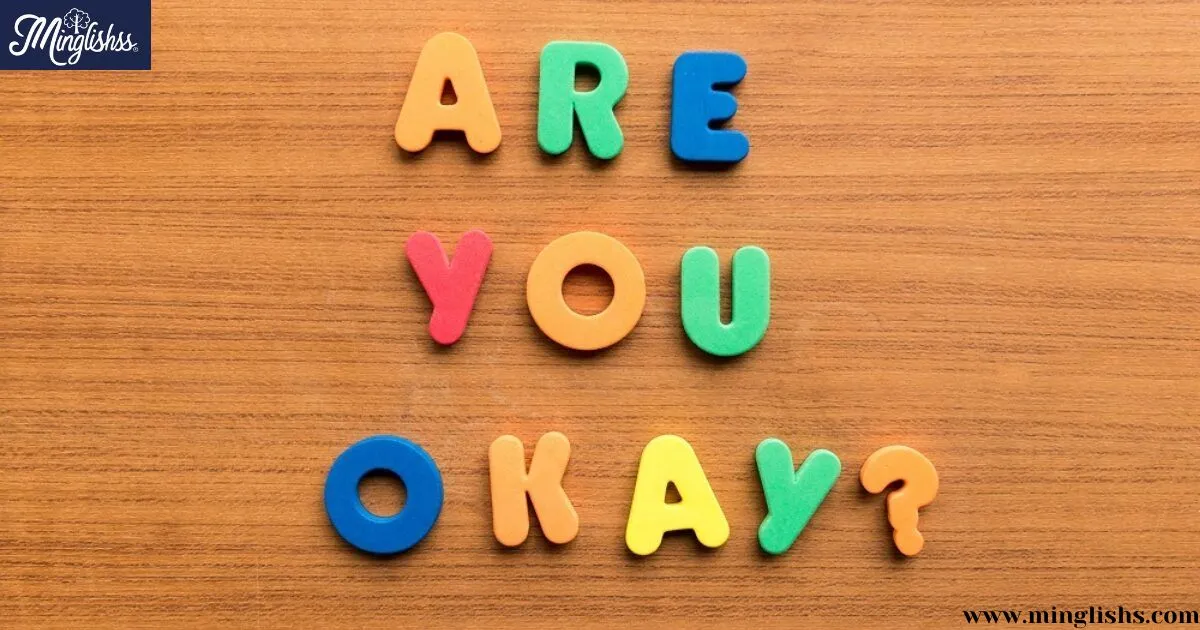“If you want to express care and concern, here are alternative ways to say ‘I hope you are okay’ that can help make your message feel more personal and thoughtful.”
Sometimes, we need to show concern for someone, but saying “I hope you are okay” might sound a bit too plain. While it’s a common phrase, there are many ways to communicate the same sentiment with a fresh, caring tone.
IF you’re checking in on a friend, family member, or colleague, having a variety of phrases can help you sound more sincere and thoughtful. In this blog, we will explore 35 different ways to say “I hope you are okay,” making your messages stand out while still expressing your care.
It’s important to keep in mind that the way we express concern can also depend on the context and the relationship we have with the person.
For example, you might want to say something more casual to a close friend or something more professional to a coworker. These variations will give you options based on your audience, making your message feel more fitting and empathetic.
The goal of this article is to provide you with a variety of alternatives that feel natural, compassionate, and thoughtful.
Each phrase will be explained in different scenarios, followed by additional tips for delivering the message effectively. By the end, you’ll have an expanded vocabulary for showing care, no matter the situation. So, let’s get started!
1. “I’m Thinking of You”
Scenario: You’re checking in on a friend who has been going through a tough time, like the loss of a loved one.
Subject Explanation: Saying “I’m thinking of you” shows that you care, but it also indicates you’re emotionally connected and mindful of their situation. This phrase is slightly more personal, making it perfect for moments when someone might need emotional support.
Additional Tip: If you know they’ve been struggling with something, mention the specific situation you’re thinking of, like, “I’m thinking of you and your family after your loss.” This shows you’re truly concerned.
2. “Are You Doing Okay?”
Scenario: A friend has recently faced a difficult situation at work and you’re checking in to see how they’re handling it.
Subject Explanation: This phrase is a more direct way to ask if someone is managing. It feels a little more casual but still expresses genuine concern. It’s great for showing that you want to know if they’re coping well with their challenges.
Additional Tip: Keep it open-ended. You can follow up with, “Let me know if you need anything,” to make it clear you’re there to support them.
3. “Is Everything All Right?”
Scenario: You’re reaching out to a co-worker who has been quiet at work lately and you’re concerned.
Subject Explanation: This phrase feels less formal than “I hope you’re okay,” but it still conveys the same message. It is useful for situations where you want to know if someone is fine but don’t want to be too intrusive.
Additional Tip: If they don’t seem to respond immediately, don’t push them. Sometimes, people need space before they open up.
4. “I Hope You’re Holding Up Well”
Scenario: You’re sending a message to a family member who’s been through a stressful life event, like a move or a health scare.
Subject Explanation: This phrase recognizes that the person may be going through something difficult but reassures them that you hope they’re coping. It’s empathetic and caring without being too heavy.
Additional Tip: You can personalize it more by adding something specific, like, “I hope you’re holding up well after the move!”
5. “I’m Here for You”
Scenario: You’re supporting a friend who has just broken up with their partner.
Subject Explanation: Sometimes, people need reassurance that they’re not alone. “I’m here for you” is a powerful reminder that you’re ready to offer support in whatever way they need.
Additional Tip: Follow up with an offer of help, like, “If you need someone to talk to or distract you, I’m here!”
6. “How Are You Feeling?”

Scenario: A family member has been ill, and you want to see how they’re recovering.
Subject Explanation: This is a more personal way to check in. It’s less about their external situation and more focused on how they are emotionally and physically feeling.
Additional Tip: Be prepared to listen. This is a great conversation starter, especially when someone may be going through a health issue.
7. “I Hope You’re Doing Well”
Scenario: You’re checking in on a colleague who’s been facing challenges at work.
Subject Explanation: This is a more neutral, professional way to show concern. It works well in formal settings and doesn’t sound overly familiar.
Additional Tip: Adding “Let me know if there’s anything I can do” makes it clear you’re willing to help.
8. “Is There Anything You Need?”
Scenario: A friend has been facing a rough patch, and you want to know if you can do anything to help.
Subject Explanation: This phrase shows that you are proactive in offering support. It invites the person to ask for help, which is important for someone who may be reluctant to ask for it.
Additional Tip: Be specific in your offer. For example, “Do you need help with groceries or just someone to talk to?”
9. “I Hope You’re Getting By”
Scenario: You’re reaching out to someone going through a tough time, like a job loss.
Subject Explanation: This phrase is a bit more casual but still expresses concern for how the person is managing. It shows you care about their well-being, even in tough circumstances.
Additional Tip: It’s helpful to follow up with a specific offer, like “Let me know if you want to grab coffee soon to talk.”
10. “I’m Sending You Positive Vibes”
Scenario: A friend is dealing with something challenging, and you want to lift their spirits.
Subject Explanation: This phrase is uplifting and positive. It conveys a sense of optimism and hope for the person, which can be comforting during tough times.
Additional Tip: You can pair this with a brief note like, “You’ve got this!” to give them encouragement.
11. “I’m Wishing You the Best”
Scenario: You’re offering support to someone going through a difficult life transition, such as moving to a new city.
Subject Explanation: This phrase is motivational and hopeful. It conveys your genuine wishes for the person’s success and happiness, even if they’re facing challenges.
Additional Tip: Acknowledge their situation and provide reassurance, like “I’m wishing you the best as you settle into your new home.”
12. “Take Care of Yourself”
Scenario: A friend is recovering from an illness, and you’re offering your well-wishes.
Subject Explanation: This is a warm, caring phrase that reminds someone to prioritize their well-being. It’s perfect when you want to show concern while also encouraging self-care.
Additional Tip: You can follow up with specific advice, like, “Make sure to get enough rest!”
13. “I’m Here If You Need to Talk”
Scenario: A loved one is going through a personal challenge, and you want them to know they can reach out to you.
Subject Explanation: This phrase shows you are available to offer emotional support. It’s a gentle, open invitation for someone to share their feelings with you when they’re ready.
Additional Tip: Sometimes, people don’t want to talk right away. Let them know that the offer stands whenever they’re ready.
14. “I Hope You’re Feeling Better”
Scenario: Someone has been ill or unwell, and you want to check in on their recovery.
Subject Explanation: This phrase directly expresses concern for someone’s health and shows you care about their improvement.
Additional Tip: You can make this even more personal by asking, “How’s your recovery going?” if you’re familiar with the person’s situation.
15. “I’m Keeping You in My Thoughts”
Scenario: You’re reaching out to someone who’s experiencing hardship, like the loss of a family member.
Subject Explanation: This phrase is often used when someone is going through something difficult. It communicates empathy and a connection to the person’s emotions.
Additional Tip: If appropriate, offer additional support, such as “If you need anything, just let me know.”
6. “I’m Rooting for You”
Scenario: A friend is about to face an important challenge, such as a job interview or a big exam.
Subject Explanation: This phrase is uplifting and motivational. It lets the person know that you believe in their abilities and are supporting them from afar. It’s perfect for situations where encouragement is needed.
Additional Tip: Pair this phrase with a personal anecdote or example, like, “I know you’ve worked hard for this, and I’m rooting for you all the way!”
17. “Let Me Know If You Need Anything”
Scenario: You’re reaching out to a neighbor who’s recently experienced a loss and might need help with daily tasks.
Subject Explanation: This phrase shows practical concern. It not only expresses empathy but also opens the door for the person to ask for specific help if needed.
Additional Tip: Be prepared to follow through. If they do ask for help, respond promptly and sincerely. Offering specific assistance, such as grocery shopping or babysitting, can make it easier for them to accept.
18. “I’m Here to Listen”
Scenario: Your colleague seems overwhelmed at work, and you want them to know they can confide in you.
Subject Explanation: This phrase is powerful in showing that you’re available to hear them out without judgment. It assures them that they can open up about their struggles whenever they’re ready.
Additional Tip: Follow this up with a friendly tone, such as, “No pressure, but I’m here if you need to talk.” This keeps the conversation open-ended and approachable.
19. “Take It One Step at a Time”
Scenario: A friend is feeling anxious about managing multiple responsibilities, like balancing work and family.
Subject Explanation: This phrase offers encouragement and reminds the person not to get overwhelmed by focusing on the bigger picture. It’s supportive and practical, showing empathy while gently suggesting how they can approach their challenges.
Additional Tip: Reinforce their strengths by saying something like, “You’ve got this, just focus on one thing at a time, and you’ll get through it.”
20. “I Hope Things Improve Soon”
Scenario: A family member is going through a stressful period at work, and you want to offer some positive reinforcement.
Subject Explanation: This phrase acknowledges that things may not be great right now but expresses optimism for a better future. It’s a thoughtful way to show concern and hope without sounding overly dramatic.
Additional Tip: Adding a personal touch like, “If you need help with anything during this tough time, I’m here,” makes the message even more heartfelt.
21. “You’re Not Alone”
Scenario: A close friend is feeling isolated after a tough breakup, and you want to reassure them.
Subject Explanation: This phrase conveys deep emotional support and reminds the person that they have someone to rely on. It can be comforting during moments of loneliness.
Additional Tip: Emphasize their value by saying something like, “I’m always here, and you mean so much to me.” This strengthens the bond between you.
22. “I Care About You”

Scenario: A colleague seems distant, and you want to show them they’re appreciated and valued.
Subject Explanation: This is a simple yet powerful phrase that expresses genuine care. It’s direct and leaves no room for misunderstanding about your intentions.
Additional Tip: Sometimes actions speak louder than words. Back up this statement with a thoughtful gesture, such as bringing them their favorite snack or checking in regularly.
23. “I’m Always a Call Away”
Scenario: A distant friend mentions they’ve been feeling down, and you want to let them know you’re available.
Subject Explanation: This phrase provides reassurance that help and support are easily accessible, even if you’re not physically present. It’s a great way to stay connected across distances.
Additional Tip: Encourage them to take the first step by saying, “Don’t hesitate to reach out anytime—you’re never bothering me.”
24. “Stay Strong, You’ve Got This”
Scenario: Your sibling is facing a major life challenge, like starting a new career.
Subject Explanation: This phrase is empowering and motivational. It acknowledges their difficulties while also boosting their confidence to overcome them.
Additional Tip: Follow up with a practical offer of help, like, “If you need advice or just someone to vent to, I’m always here.”
25. “I’m Thinking of You and Sending Love”
Scenario: A friend is grieving the loss of a loved one, and you want to send a comforting message.
Subject Explanation: This phrase combines emotional connection with warmth, making it ideal for sensitive situations. It shows that your thoughts and support are with them even if you can’t be physically present.
Additional Tip: Add something specific, like, “I hope the love and memories you shared bring you comfort during this time.”
26. “How Can I Support You?”
Scenario: A coworker seems overwhelmed by a big project, and you want to offer help.
Subject Explanation: This phrase directly offers assistance and invites the person to express their needs. It’s proactive and caring, especially in situations requiring teamwork.
Additional Tip: Be specific by saying, “Can I help with a specific task, like organizing files or handling a report?” This can make it easier for them to accept.
27. “It’s Okay to Take Your Time”
Scenario: A friend is processing a tough situation and feels pressured to move on quickly.
Subject Explanation: This phrase encourages patience and self-compassion. It reminds the person that healing and recovery don’t have to follow a set timeline.
Additional Tip: Reassure them by sharing, “I’ll be here no matter how long it takes.”
28. “You’re Doing Better Than You Think”
Scenario: A friend is doubting their progress on a personal goal, like fitness or learning a new skill.
Subject Explanation: This phrase reinforces their achievements, helping them see the positive side of their efforts. It’s uplifting and boosts their morale.
Additional Tip: Acknowledge specific accomplishments, like, “You’ve already made so much progress, and that’s amazing!”
29. “I Hope You’re Taking Time for Yourself”
Scenario: A family member is juggling multiple responsibilities and seems exhausted.
Subject Explanation: This phrase gently reminds them to prioritize self-care. It shows concern for their overall well-being and encourages them to slow down.
Additional Tip: Suggest specific ways to relax, like, “Maybe take a day to pamper yourself—you deserve it!”
30. “You’re In My Thoughts”
Scenario: A friend has moved to a new city, and you want them to feel remembered.
Subject Explanation: This phrase is a kind and subtle way of showing that they’re still on your mind, even from afar. It’s especially useful for maintaining long-distance connections.
Additional Tip: Add a personal touch by saying, “I’d love to hear how you’re settling in!”
Practical Ways to Use These Phrases
1. In Daily Conversations
Make these phrases part of your regular interactions. For example, when catching up with friends or colleagues, use options like “How can I support you?” or “You’re doing better than you think.” These expressions help create a comforting environment and encourage open communication.
2. Through Written Communication
In texts, emails, or even letters, phrases like “You’re in my thoughts” or “I’m rooting for you” can be a great way to convey support. Writing adds a level of thoughtfulness, allowing the recipient to revisit the message whenever they need reassurance.
3. In Professional Settings
When reaching out to coworkers or clients facing challenges, phrases like “Let me know if you need anything” or “Take it one step at a time” can strike the right balance between professionalism and compassion.
4. With Family Members
Family relationships thrive on emotional support. Use phrases such as “I care about you” or “You’re not alone” to express genuine concern. Adding a specific gesture, like offering to spend time together, enhances the message.
5. During Challenging Times
For situations involving grief, stress, or health issues, expressions like “I’m here to listen” or “I hope things improve soon” provide solace. Tailor your choice based on the person’s current emotional state to ensure your message is comforting and appropriate.
Frequently Asked Questions
1. Why is it important to find alternatives to “I hope you are okay”?
Finding alternatives helps personalize your message, making it more meaningful. It shows you’ve put thought into your words, which can strengthen your connection with the recipient.
2. How can I ensure my message feels sincere?
Use a tone that matches the situation and relationship. Adding personal touches, like specific offers of help or references to shared experiences, enhances sincerity.
3. Are these phrases suitable for all situations?
Most of these phrases are versatile but may need to be adapted based on context. For example, “You’re not alone” works well in emotional situations, while “Let me know if you need anything” is more practical.
Pros and Cons
Pros:
- Using varied phrases helps express empathy in a more personalized way.
- It allows for flexibility depending on the situation and relationship.
- It can make the person feel more supported and understood.
Cons:
- Some phrases may sound too formal or impersonal in certain contexts.
- It’s important to consider the person’s emotional state to avoid sounding dismissive or indifferent.
Conclusion
There are many ways to say “I hope you are okay” that can help convey your concern more effectively and personally. From offering emotional support to simply checking in, these 35 alternatives provide you with a wide range of options to express care and empathy
iFit’s a close friend, family member, or coworker, using the right phrase for the situation can help strengthen your relationships and show the person that you are truly thinking of them. Always remember to follow up with specific offers of support when possible, as this can make your message even more impactful.

Hi, I’m Zadie Smith: I’m dedicated to helping others master English through practical tips. I enjoy making complex ideas simple and accessible for everyone.










